Iraq || In Constant Fear
In Iraq, pro-Iranian militias are killing democracy activists and the government is doing nothing about it. The power of the militias is endangering the country - and the entire region.
The fear is like a burdock. It sticks to him, no matter how hard he tries, he can't shake it off. Whenever he leaves the house, he looks behind him to see if anyone is following him; on every street corner he checks whether a suspicious car is parked anywhere. Sometimes, says Mohammed al-Temimi, a black SUV with no license plate chases him. Just a week ago, two men who looked like militiamen, muscular and with shaved heads, bumped into him in front of a falafall shop. "They wanted to make it clear to me that they were watching me."
Mohammed al-Temimi supports the protest movement that arose in October 2019 in the Iraqi capital Baghdad and the southern provinces of the country and whose supporters revolt against the rulers' corruption and nepotism. Til today. The 21-year-old is sitting on the grass in a park in Baghdad and pulls on his cigarette. It is around 40 degrees Celsius on this June day and a hot wind is blowing from the Tigris. Al-Temimi is a thin, bright-eyed man who scour every corner of the park as he talks about the months that have changed his life.
"I was hoping for the great coup in Iraq," says Al-Temimi. He was euphoric when he shouted out his anger on Tahrir Square in central Baghdad with thousands of schoolchildren and employees about the criminals, as he calls the political leaders. A fresh start seemed so tangible this fall of 2019 when Prime Minister Adil Abd al-Mahdi resigned . Al-Temimi and the others believed that Iraqcould be a country where even those who are not affiliated with the elite can find well-paid jobs. That their country could be sovereign, free from the influence of neighboring Iran and the terror of the militias. Women and men like Al-Temimi, they want to be citizens in a constitutional state. They hold on to this vision. And that can cost her her life.
They execute their victims in the middle of the streetAl-Temimi and the other activists fear Iran- backed Shiite militias that are becoming increasingly powerful in Iraq and which, if no one can stop them, could take control of the whole country. Almost 600 people have been killed and around 24,000 injured since the protests began. By police officers and security forces who use violence against the demonstrators. But also by pro-Iranian militias who threaten, kidnap and torture activists and human rights activists and journalists. Sometimes the militias execute their victims in the middle of the street. This happened to the human rights activist Reham Jakub from Basra, who was behind the wheel of her car when attackers on motorbikes shot her. And the terrorism expert Hisham al-Hashimi, shot the assassin outside his house in Baghdad and who later succumbed to his injuries. The activist Ihab al-Wasni was murdered just a few weeks ago, after which thousands gathered in Tahrir Square to demonstrate against the violence of the militias.
The tension is written on the city's face. Baghdad is always heavily secured, but these days the city is like a fortress. Checkpoints have been set up at almost all intersections in the city center, armed security forces patrol around Tahrir Square, the entrances to the Green Zone, where government buildings and foreign embassies are located, can hardly be passed due to the large number of tanks.
Read more: Khamenei wanted Raissi as president
It just seemed as if Iraq was recovering. After the so-called "Islamic State" (IS) in Iraq was considered defeated in 2017, the world breathed a sigh of relief. The Iraqis also hoped for a little normalcy. There were hardly any more attacks in Baghdad, people strolled again on the banks of the Tigris. But problems grew beneath the apparently peaceful surface. Iraq is experiencing a financial crisis, corruption is blocking reconstruction. The expulsion of IS has left a power vacuum in the country, which militias are now fighting for, some of which are mutually hostile.
The militias are more powerful than everAlthough the majority of Iraqis are Shiites, the Sunni Iraqis held political power for a long time. Saddam Hussein, who set up a violent regime from 1979, brutally suppressed Kurds, Shiites and everyone who criticized him. When the US toppled Hussein in 2003, it also instituted a new electoral system. Since then, Shiite parties have always got the majority, they also provide the head of government and occupy important positions in politics and the military. The transition was not peaceful. Nouri al-Maliki, Prime Minister from 2006 to 2014, now discriminated against the Sunni Iraqis. Many then joined Sunni jihadist groups, al-Qaeda for example and later the IS. IS continues to carry out attacks in Iraq, most recently in January of this year on a market in Baghdad.
Read also: Joe Biden has promised that "we will leave no one behind."
And at the same time the terror of the pro-Iranian groups is shaking the country. These militias are part of the Al-Hashd al-Shabī, the so-called People's Mobilization Units, an alliance of Shiite paramilitary groups that was formed in 2014 to fight back IS. The deployment of the militias was decisive for the war, because the Iraqi army was defeated in the fight against IS. Some militias were newly established for this mission, others had been active in Iraq long before. The powerful Badr Corps (now the Badr Organization), for example, which were founded in Iran in the early 1980s and fought against Saddam Hussein. Other pro-Iranian militias carried out attacks on US troops after the US invasion, some of their successor or splinter groups have been doing so to this day, intensified again since the deadly drone attack on Iran's top general Kassem Soleimani near the airport in Baghdad in January 2020 . Quite a few here fear a new war if the Americans strike back against the militias.
With the victory over IS, the militias became more powerful than ever. They are formally subordinate to the Iraqi Prime Minister and are part of the Iraqi security forces, but many militias listen to the command of the Revolutionary Guards in Tehran, from whom they are trained and advised, and in some cases also financed; this includes the Kata'ib Hezbollah, which the USA classifies as a terrorist organization.
Many militias are notorious for their criminal machinations and their brutality. They fire missiles at US bases and attack vehicles belonging to foreign diplomats. And they get rid of those who work for a democratic Iraq. The crimes against the activists are carried out by a few, particularly radical militias, who are increasingly cruel. Many activists name two militias in particular: Asa'ib Ahl al-Haqq, which was founded by a combat unit of the Iranian Revolutionary Guard, and Kata'ib Hezbollah. Research by the BBC supports this assumption."The murder destroyed the whole family"
The violence of the militias is tearing families apart. This is reported, for example, by the parents of Salah al-Shamari, a 38-year-old who ran a stand for cell phone accessories on a main street in eastern Baghdad. Al-Shamari was present at every protest. Even after snipers shot him in the leg, he posted a video on social media saying, "We protesters will die with honor, but you other Iraqis will die humiliated." At around 6 p.m. on December 15, 2020, Al-Shamari was packing up his things when men shot him in the back from behind. There were nine bullets in his body.
Read more: Donald Trump, proposed sending naval base in Guantanamo to US patients Covid-19
This is how Al-Shamari's mother and father tell it. They are sitting on the sofa in their living room, on one wall there is an oversized photo of Salah, an agile man with a cap and a neatly trimmed beard, on the opposite wall is a picture of Imam Al-Husain, a grandson of the Prophet Mohammed is a central figure for Shiite Muslims. Al-Shamari's wife and children, two girls and two boys, now also live in the parents' house. "This murder destroyed the whole family," says the mother, pulling the black chador deep in the face. The father nods. "Our youth just want a better future," he says, and his voice sounds bitter. "But anyone who rises up against the bad conditions will be killed."
You can often hear bitterness when you talk to Iraqis. Like so many, Al-Shamari's parents also support the demonstrations because they see that they are not getting any of the wealth that Iraq has from its oil reserves, for example. Because they can barely make ends meet while the political leaders indulge in luxury. Because even well-educated Iraqis cannot find work. And now protesters who are their children, friends and colleagues are also being killed. That they are risking their lives in speaking their minds makes them feel like they are losing the last bit of dignity. Or, as a friend of Al-Shamari's parents put it: "We Iraqis are being catapulted straight back into the Middle Ages."
At least since the murder of their son, Al-Shamari's parents no longer trust the authorities. A police car was parked not far from Salah's stand, the father said, but the police officers did not help Salah, presumably because they were cooperating with the militia. Something else is strange: the street where Al-Shamari worked is monitored by cameras. But on the day of Salah's murder, the cameras were switched off, the family's interior ministry had confirmed. Officially because of a technical defect, but the parents are sure: someone manipulated them to protect the perpetrators. Thefts are always documented, says the father, but not the attacks by the militias. "The authorities know who killed Salah," he says. "But they are hindering the investigation."
The criminals get away with anythingThis is also what Ali al-Dahhmat says, who is staying in a secret place. The 51-year-old has gone into hiding and is constantly changing accommodation. His name is on two militia death lists that are circulating on social networks, and he shows them on his cell phone. Mohammed al-Temimi, the young activist from the park, has also seen his name on such lists. In addition, there are sentences such as: "If the people named here do not renounce the so-called October Uprising, we will kill them." The militias also post photos of activists on social media, branding them as spies or homosexuals. Many are killed after such campaigns.
Read also: Lady Diana suffered a "very serious internal bleeding"
This happened to Ali al-Dahhmat's brother Amjed, who led the protests in the southern Iraqi city of Amarah until unknown persons shot him to death in November 2019. "We wanted to initiate a process through the local police chief so that those responsible could be held accountable," says Al-Dahhmat. "But the case was not pursued." The police are riddled with militias, he says. "These people have no interest in solving the murders."
Like Ali al-Dahhmat and the parents of Salah al-Shamari, many relatives of those who were murdered are angry with the government. A government that tries to meet the expectations of two archenemies - the US and Iran - and appears to fail catastrophically. Prime Minister Mustafa al-Kadhimi, in office since May 2020 , had promised the demonstrators reforms to investigate the crimes against the activists and to curb the influence of armed groups. None of that happened. On the contrary: many observers say that Kadhimi's weakness made the militias even stronger.
The militias should not get away with their brutal actions, that's what the lawyer Amel Huseen is committed to. We meet her in a café on a side street in downtown Baghdad. On this quiet morning only the fan on the ceiling hums with monotonous regularity. Huseen is 6o, a petite woman with a combative look. She had to leave Baghdad three months ago because a tuk-tuk was parked in front of her house for days, in it two men in black clothes, presumably a killer squad. Her brother, who lived with her, fled to Turkey, Huseen now lives outside Baghdad.
Huseen has been campaigning for human rights in their country for a long time. In the past few months she has offered free legal assistance to demonstrators arrested by the police, and has taken many out of prison. "There is no justice," says Huseen. So far not a single murder has been solved, although Kadhimi has even set up a special investigation unit. Sometimes the government would arrest members of the militia, but then release them straight away, allegedly for lack of evidence. "The state did not even compensate the relatives of the murdered financially."The demonstrators are a problem for those in power, says Huseen. Because they wanted to overthrow the regime and many Iraqis supported it. Because they criticized Iranian influence and questioned the rule of the militias. Huseen says she keeps hearing from the activists that the Iranian leadership is directing the killings. "I think that's likely because the protests run counter to Iran's interests." The Revolutionary Guards in Tehran, she says, are under financial pressure because of the US sanctions and need Iraq. For through their militias they not only controlled Iraq's economy and banking, but also operated money laundering and arms trafficking in Iraq. In addition, they would influence Iraqi politics and justice through their representatives in the parties. "no matter who is president, want to prevent losing this system by all means.
Read more: "The days when global decisions were made by a small group of countries are long gone,"
Huseen and the others continue to work so that the murders do not go unpunished. Huseen is currently supporting the protest movement in forming a political opposition group. Many demonstrators have formed political parties, and some have stood as candidates for the autumn parliamentary elections. But Huseen wants something else. The demonstrators had set a condition for the government to agree to vote in the autumn election: Al-Kadhimi should reveal the names of the murderers. But he didn't. So Huseen and others want to boycott the election to increase the pressure on the government. "The government knows those responsible," says Huseen. "If she wanted to bring the killers to justice, she could do that."
The fear of civil war
The threat posed by the pro-Iranian militia can be guessed at if you speak to people who are close to a Shiite militia and emphasize: "These groups are very dangerous." That's what Essam Lafi says, who doesn't want to see his real name published for security reasons. Lafi succeeds Muqtada al-Sadr, a powerful Shiite legal scholar, militia leader and politician; Lafi is a kind of spokesman for the movement. The Sadr movement, says Lafi, condemns the violence against the demonstrators, many sadrists protested against the government themselves.
Especially at the beginning of the protests, many demonstrators came from Sadr City, where some militias are based and where the Sadr movement traditionally recruits its supporters. Sadr City is named after Mohammed Sadik al-Sadr, a Shiite leader and the father of Muqtada al-Sadr.
The district in the north-east of Baghdad is considered the city's largest poor district: there is hardly any electricity, many buildings are dilapidated and most of the residents are unemployed. From Sadr City, Al-Sadr once sent his militiamen to fight the US troops, today he is considered more moderate. The Sadr movement has been represented in parliament since 2010, and in the 2018 election an alliance between Al-Sadr and secular forces received the most votes. Al-Sadr is considered a nationalist, he is not the Iranians' stooge, but has accepted Iranian support for his fighters.
Lafi says the Sadr militia protected the protesters from the security forces during the protests and freed some women and men who had been kidnapped and tortured. Some activists confirm this. However, they say Sadr is abusing the protests to gain more authority in politics.
From the perspective of the radical militias, says Lafi, the demonstrators are hired by the United States and the Gulf States to undermine the Shiite authority. The Iraqi government has good reason to hold back against them and not hold them accountable: "A direct confrontation with the militias could lead to civil war."
The militias are ruining Iraq
Hamed al-Mutlak would like to prevent political interests from fueling conflicts between Sunnis and Shiites - and also Kurds - in the country. At the other end of Baghdad in his office, the Sunni politician receives upholstered furniture, a desk made of dark wood, next to it is accurately draped the Iraqi flag. The 72-year-old is a friendly man who weighs his words. He says: "Sectarian violence is destabilizing not only Iraq, but the entire region." Al-Mutlak used to be in the Iraqi army, after the US invasion he went into politics and founded the secular Party for Dialogue and Change, which campaigns for democratic structures and against religious sectarianism.
Iran, says al-Mutlak, uses Iraq as a kind of buffer zone from which to fight the United States. Even more: Iran now controls many other areas in the Middle East. "Iran's leadership wants to create a Persian empire through the militias." And quite violently. In Syria, pro-Iranian militias are driving out and killing civilians and opposition members to support dictator Bashar al-Assad; in Yemen, the Shiite Houthi militias are committing similar crimes against civilians, including the Lebanese Hezbollah, which is part of this anti-Western, anti-Israel "axis of resistance" , such as the journalist Michael Young describes it, eliminates unpleasant opponents.
"The western leaders are not doing anything to stop the militias," says Al-Mutlak. "Even many Shiites do not want to be ruled by Iran." The Americans in particular have the responsibility to stabilize Iraq, after all, they would have once dragged the country into the abyss. Will the new US President Joe Biden strengthen the Iraqis? Al-Mutlak waves it away. He is pursuing his own interests, especially the nuclear deal with the Iranians. "So far, Joe Biden has achieved nothing, either in Iraq or anywhere else in the Middle East."
Back in the park, Mohammed al-Temimi lit another cigarette. He dropped out of school to demonstrate that he now wants to study art. His dream of the great revolution did not come true. Still, he says, the uprising was important. He brought people together, showed that religious and ethnic affiliations do not have to play a role. Democracy is the only way, he says, even if Iraq is not yet ready for it. And so Al-Temimi will be back at the next protests, despite all the dangers. "We have to show the world that we are holding on to our cause."
Do You Know What I Have Posted on










Comments
Post a Comment